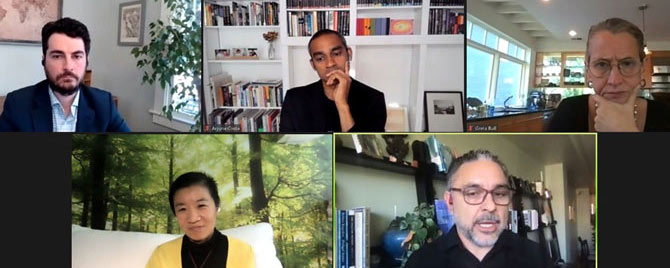The tragic events of the COVID-19 pandemic have emphasized the importance of having a financial system that works for everyone. The San Francisco Fed, along with the entire Federal Reserve System, has made a serious commitment to focus on our role in thinking about how monetary policy, payments, and financial regulation and supervision can work together not just to provide access but to enable the economic lives of all citizens.
As part of this effort, the SF Fed released the Framework for Change, which
is how we will take action toward greater racial and ethnic equity in our organization and the communities we serve. And our Supervision + Credit Fintech team continues to research the impact of financial technology on financial inclusion efforts around the world.
Financial Inclusion and Beyond
The past year has only emphasized how important it is to meet challenges with good thinking and creativity from all over the world. This is why the Fintech team created the Financial Inclusion & Beyond podcast series, which considers the topic of financial inclusion from a range of perspectives.
We also hosted a related virtual event to explore lessons from around the world in the use of technology and public policy to build more inclusive financial systems and drive financial health. Sean Creehan, the Fintech team’s lead for financial health and inclusion, moderated the event. The panel included several guests from the podcast series, bringing together professionals from different corners of the financial inclusion and health spaces:
- Greta Bull, president and chief executive officer of the Consultative Group to Assist the Poor (CGAP)
- José Quiñonez, founding CEO of Mission Asset Fund (MAF)
- Arjuna Costa, a managing partner at Flourish Ventures
- Ting Jiang, a behavioral economist
Here are our key takeaways from the discussion.
COVID exacerbates exclusion and poor (financial) health
It was not a surprise to hear that the COVID-19 pandemic has dramatically affected efforts to improve financial inclusion and health. Organizations like CGAP, a World Bank Group affiliate, and MAF, which traditionally focus on the longer-term issues of inclusion, had to re-focus efforts almost overnight to deal with issues related to public health. Greta Bull, the CEO of CGAP, highlighted how those countries, which had invested in digital financial system infrastructure could respond with stimulus relief quicker than those that relied on traditional modes.
Ting Jiang zeroed in the pandemic’s effects at the individual level. For Jiang, a behavioral economist who sums up her work as “helping individuals conquer our inner Homer Simpson,” instilling good financial habits despite cognitive friction is difficult at the best of times. She talked about how to design policy and develop products and technologies that help people navigate moments of stress.
Financial systems can create inclusion and equity through innovation
The conversation also addressed the unequal impact of the past year’s twin economic and health shocks on populations. Combined, they’ve refocused attention to a number of inequities. In our collective work, that includes renewed questions about how more inclusive financial systems can increase equity for marginalized communities—whether they face barriers based on race, gender, age, or other characteristics.
MAF’s José Quiñonez, who also chairs the SF Fed’s Community Advisory Council, advocates for meeting people where they are. Low- and moderate-income (LMI) communities shouldn’t be forced to be secondary or third-order users of financial products but should have access to products designed for their lifestyles. Fintech should be celebrated when it is also in service of LMI communities, not simply because touts the “bells and whistles of technology.”
Flourish Ventures’ Arjuna Costa emphasized that it’s expensive for poor people to use the US financial system and suggested ways innovation in technology and regulation can reduce frictions that otherwise increase cost for firms and make it harder for individuals to make good choices.
The domestic and international perspectives that panelists brought highlight the universality of challenges in expanding inclusion and improving financial health. On the SF Fed Fintech team, we are committed to continuing this conversation on improving financial inclusion and health, and amplifying lessons wherever we find them.
Listen to Pacific Exchanges Podcast Season 4: Financial Inclusion & Beyond
Paul Tierno is the Fintech team lead for cloud resources among banks and nonbank fintechs at the Federal Reserve Bank of San Francisco. He previously covered Asian economies as part of the Bank’s Country Analysis Unit, with special focus on South Korea and Southeast Asia.
You make also like:
The views expressed here do not necessarily reflect the views of the management of the Federal Reserve Bank of San Francisco or of the Board of Governors of the Federal Reserve System.
